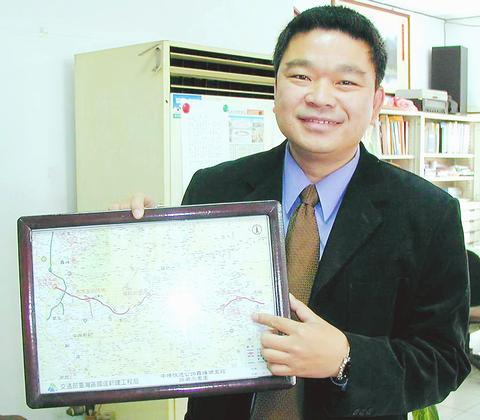DPP lawmaker Tsai Huang-liang (
The end of the battle means that Tsai, the party's chief convener for the past eight months, can finally go back to being just a lawmaker.

TAIPEI TIMES FILE PHOTO
When his DPP colleagues Ker Chien-ming (

The dispute between the three began on Feb. 1 when internal party voting chose them to lead the DPP legislative caucus.
According to the party's internal rules, the three lawmakers that emerge with the most votes should decide among themselves who should be the chief convener, chief executive and secretary-general of the caucus.
But days after the voting took place, a dispute that erupted between the trio over who should lead the caucus remained unresolved, embarrassing the ruling party just after it lost a bruising fight for the legislative vice speakership to the opposition.
Eventually, Hsu, the only woman elected to the once male-only preserve, compromised with Ker and Wang and agreed to assume the post of secretary-general. Ker and Wang then took the positions of chief convener and chief executive, respectively.
Marching into battle
In his time as the party's chief executive, Tsai was an important strategist who led the caucus in many battles in the volatile legislature.
Two of the most recent examples are the race for legislative speaker and vice speaker, and the Executive Yuan's veto motion to overturn amendments to the budget allocation law.
Tsai said that the outcomes of the two battles were not surprising.
"Take the vice-speakership race for example. We lost because the pan-green camp is, after all, a minority coalition in the legislature," he said.
A different strategy, however, was adopted in the battle to overturn the amendments, Tsai said, because it was a public policy issue and concerns people's interests.
"When an issue has more to do with public interest instead of partisan interest, you stand a better chance of successfully convincing opposition parties to take your side because you can present them with scientific figures," he said.
Tsai said there weren't any under-the-table deals made in either fight.
"If there was, we wouldn't have lost in the race for legislative vice speaker. Besides, it's extremely difficult to conduct under-the-table negotiations when media and legislative scrutiny are so intense."
Commenting on President Chen Shui-bian's (
"It seems that he has been transformed from an opposition politician to a leader of the ruling party," Tsai said. "Although he has his own mind, he's a liberal administrator who's willing to listen to different opinions."
Tsai, whose days as chief convener started at 6am and ended at midnight, said that he both gained and lost a lot during his eight months in the position.
"While I've learned to be a more mature politician and to be more prudent in my personal conduct and when making public statements, I hardly had any time for my own family [in Nantou County]," he said.
Tsai said that he does not feel at all despondent about leaving the post because he said there is much talent in the party.
"I feel great because I'll have more time for myself, my family and my electorate," he said. "I'll also have time to push several bills which have been brewing in my mind for quite some time."
Tsai said he is particularly interested in proposing a mudslide prevention bill and a bill on oral hygiene.
Humble beginnings
Tsai was born into a poor tenant farmer's family of nine in Puli, Nantou County. He graduated from a two-year college that was previously affiliated with National Chengchi University and is now affiliated with the National Open University.
"I remember my parents couldn't afford to buy us shoes until I was in the third grade, and our satchels were made from the bags that US-donated flour came in," he said.
Poverty did not defeat Tsai but instead made him realize the importance of hard work and modesty.
The life of the 42-year-old farmer's son took a dramatic turn in 1979 when a state crackdown followed an anti-government parade organized by the Formosa magazine in Kaohsiung.
The ruling KMT jailed eight people for their involvement in what later became known as the Kaohsiung Incident (
"What the government did to those people just made me feel sick in my stomach and detest the KMT regime even more," he said.
After completing his military service, Tsai began to participate in democratic movements and became a DPP member when the party was legalized in 1986.
He started his political career in 1984 as a township representative in his hometown.
In the 18 years following, he has assumed positions ranging from a township arbitrator to lawmaker.

DEFENDING DEMOCRACY: Taiwan shares the same values as those that fought in WWII, and nations must unite to halt the expansion of a new authoritarian bloc, Lai said The government yesterday held a commemoration ceremony for Victory in Europe (V-E) Day, joining the rest of the world for the first time to mark the anniversary of the end of World War II in Europe. Taiwan honoring V-E Day signifies “our growing connections with the international community,” President William Lai (賴清德) said at a reception in Taipei on the 80th anniversary of V-E Day. One of the major lessons of World War II is that “authoritarianism and aggression lead only to slaughter, tragedy and greater inequality,” Lai said. Even more importantly, the war also taught people that “those who cherish peace cannot

STEADFAST FRIEND: The bills encourage increased Taiwan-US engagement and address China’s distortion of UN Resolution 2758 to isolate Taiwan internationally The Presidential Office yesterday thanked the US House of Representatives for unanimously passing two Taiwan-related bills highlighting its solid support for Taiwan’s democracy and global participation, and for deepening bilateral relations. One of the bills, the Taiwan Assurance Implementation Act, requires the US Department of State to periodically review its guidelines for engagement with Taiwan, and report to the US Congress on the guidelines and plans to lift self-imposed limitations on US-Taiwan engagement. The other bill is the Taiwan International Solidarity Act, which clarifies that UN Resolution 2758 does not address the issue of the representation of Taiwan or its people in

Taiwanese Olympic badminton men’s doubles gold medalist Wang Chi-lin (王齊麟) and his new partner, Chiu Hsiang-chieh (邱相榤), clinched the men’s doubles title at the Yonex Taipei Open yesterday, becoming the second Taiwanese team to win a title in the tournament. Ranked 19th in the world, the Taiwanese duo defeated Kang Min-hyuk and Ki Dong-ju of South Korea 21-18, 21-15 in a pulsating 43-minute final to clinch their first doubles title after teaming up last year. Wang, the men’s doubles gold medalist at the 2020 and 2024 Olympics, partnered with Chiu in August last year after the retirement of his teammate Lee Yang

The Philippines yesterday criticized a “high-risk” maneuver by a Chinese vessel near the disputed Scarborough Shoal (Huangyan Island, 黃岩島) in a rare incident involving warships from the two navies. The Scarborough Shoal — a triangular chain of reefs and rocks in the contested South China Sea — has been a flash point between the countries since China seized it from the Philippines in 2012. Taiwan also claims the shoal. Monday’s encounter took place approximately 11.8 nautical miles (22km) southeast” of the Scarborough Shoal, the Philippine military said, during ongoing US-Philippine military exercises that Beijing has criticized as destabilizing. “The Chinese frigate BN 554 was